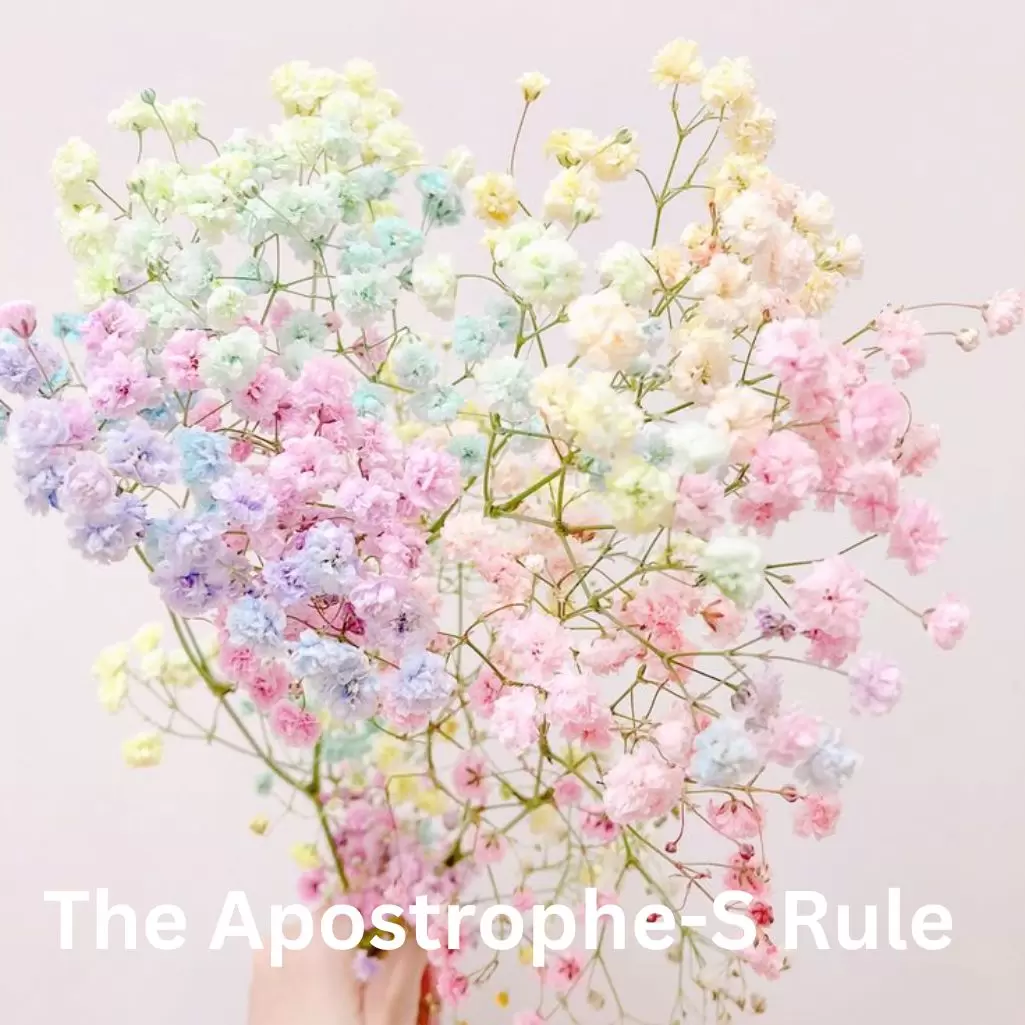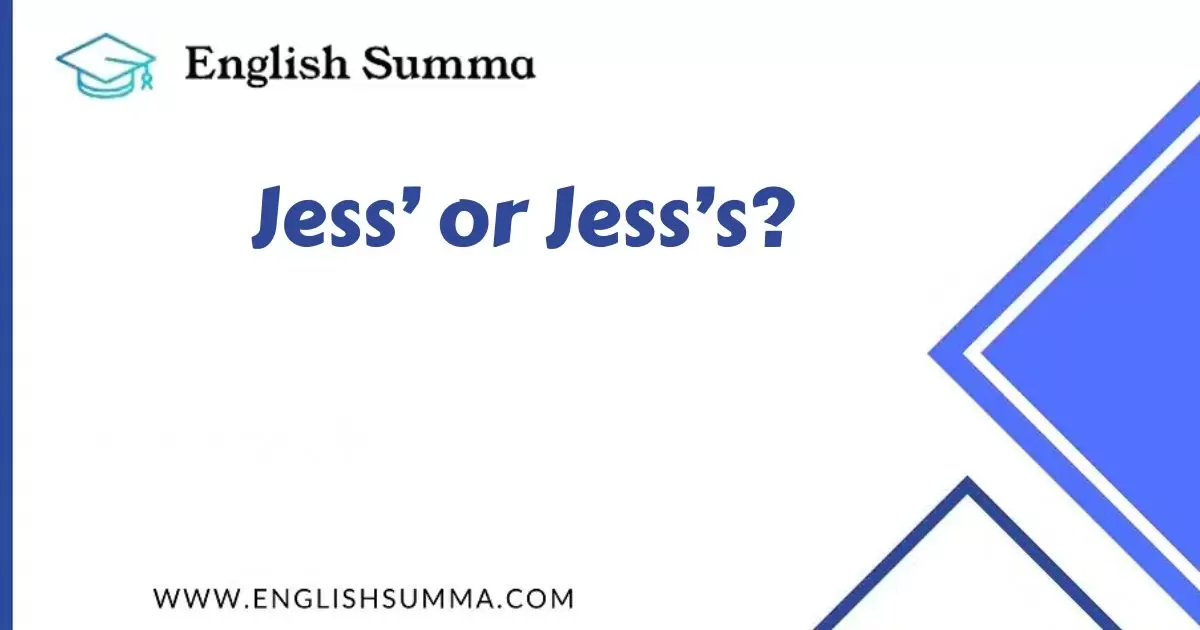When it comes to indicating possession in English, a common source of confusion arises with words ending in ‘s’. The question often debated is whether to use ‘Jess’ or Jess’s’ to denote something belonging to someone named Jess. This seemingly simple question can stir up considerable debate among writers, editors, and language enthusiasts.
To unravel this linguistic puzzle, let’s delve into the nuances of possessives and explore when to use each form.
Understanding the Basics of Possessives
Before delving into the specifics of ‘Jess’ or Jess’s,’ it’s crucial to grasp the fundamentals of possessives in English. A possessive is a grammatical construction that indicates ownership or association between two entities. In English, possessives are typically formed by adding an apostrophe and sometimes an additional ‘s’ to the noun.
The Apostrophe-S Rule

The apostrophe-S (‘s) construction is the standard way to form possessives in English. It is used to indicate possession for singular nouns, regardless of whether the noun ends in ‘s’. For example:
- Jess’s cat
- John’s car
- The dog’s bone
In each of these examples, the apostrophe-S construction is employed to show ownership. Note that the possessive form is used whether the noun is a person (‘Jess’), a proper noun (‘John’), or an object (‘the dog’).
Exceptions for Plural Nouns
When forming possessives for plural nouns that end in ‘s’, the apostrophe is placed after the ‘s’ without adding an extra ‘s’. For instance:
- The students’ textbooks
- The teachers’ lounge
In these cases, the plural nouns already end in ‘s’, so adding another ‘s’ after the apostrophe would be redundant.
The Case of Jess’
Now, let’s turn our attention to the specific case of ‘Jess’.’ This form is often referred to as the “apostrophe only” or “apostrophe-ending” possessive. It is used when the singular noun ends in ‘s’. This usage stems from a historical convention aimed at simplifying pronunciation and maintaining readability. However, it’s worth noting that not all style guides and grammarians agree on its correctness.
Usage in Singular Possessives
The ‘Jess’’ construction is commonly seen in both formal and informal writing. For example:
- Jess’ house
- Jess’ car
- Jess’ idea
In each of these cases, the possessive form is indicated by the apostrophe only, without adding an extra ‘s’ after it. This usage adheres to the principle of clarity and ease of pronunciation.
Historical and Stylistic Considerations

The use of ‘Jess’’ as a possessive form has historical roots in English grammar. It is derived from earlier forms of the language, where the addition of an extra ‘s’ after the apostrophe was not standard practice. Over time, however, language usage has evolved, leading to variations in style and preference among writers and editors.
The Case of Jess’s
Contrary to ‘Jess’,’ ‘Jess’s’ follows the traditional apostrophe-S rule for forming possessives. It is used when indicating possession for singular nouns, including those that end in ‘s’. While some style guides advocate for this form, others consider it redundant in cases where the singular noun already ends in ‘s’.
Usage in Singular Possessives
The ‘Jess’s’ construction adheres strictly to the apostrophe-S rule, regardless of whether the singular noun ends in ‘s’. For instance:
- Jess’s cat
- Jess’s house
- Jess’s car
In each instance, the possessive form is formed by adding apostrophe-S after the noun, even though ‘Jess’ itself ends in ‘s’.
Stylistic Variation and Personal Preference
The use of ‘Jess’s’ as a possessive form reflects adherence to traditional grammatical rules. Some style guides, such as The Chicago Manual of Style, advocate for this form in all cases of singular possessives, irrespective of the final letter of the noun.
However, other guides, like The Associated Press Stylebook, offer more flexibility, allowing for the use of ‘Jess’’ in cases where adding another ‘s’ may seem awkward or cumbersome.
Read Also More: The Nuances of Possessives: Girl’s, Girls’, or Girls?
Choosing Between Jess’ and Jess’s
Given the variations in style and preference, writers often find themselves at a crossroads when deciding between ‘Jess’’ and ‘Jess’s’ in their writing. Several factors can influence this decision, including the context of the sentence, personal or editorial style preferences, and adherence to specific style guides.
Consider the Sound and Flow
One crucial factor to consider when choosing between ‘Jess’’ and ‘Jess’s’ is the sound and flow of the sentence. While both forms are grammatically correct, ‘Jess’’ may offer a smoother, more natural cadence in certain contexts, particularly when the possessive noun is followed by another word beginning with ‘s’.
- Jess’ sense of humor
- Jess’s sister’s wedding
In the first example, ‘Jess’’ avoids the potential awkwardness of consecutive ‘s’ sounds (‘Jess’s sense’). However, in the second example, ‘Jess’s’ maintains consistency in adhering to the apostrophe-S rule.
Adhere to Style Guidelines
For writers working within a specific style framework, such as academic writing or journalism, it’s essential to adhere to the guidelines provided by the relevant style manual. Whether it’s APA, MLA, Chicago, or AP style, each guide may offer specific recommendations or allowances regarding the use of possessives ending in ‘s’.
Maintain Consistency
Consistency is key in ensuring clarity and readability in writing. Whichever form you choose—’Jess’’ or ‘Jess’s’—it’s essential to maintain consistency throughout your writing. Switching between forms within the same piece can confuse readers and detract from the overall quality of your writing.
Scenario Examples
To illustrate the use of ‘Jess’’ and ‘Jess’s’ in various contexts, let’s consider some scenario examples:
Informal Conversation
- Friend 1: Whose car is parked outside?
- Friend 2: Oh, that’s Jess’ car.
In this informal conversation, ‘Jess’’ is used to indicate possession casually and naturally.
Formal Writing
- In her thesis, Sarah analyzed Jess’s contribution to modern literature.
In formal writing, such as academic papers, ‘Jess’s’ may be preferred for adherence to style guidelines and conventions.
Newspaper Article
- Jess’s new book explores themes of identity and belonging.
In journalistic writing, the choice between ‘Jess’’ and ‘Jess’s’ may depend on the specific style guide followed by the publication.
Creative Writing
- The protagonist admired Jess’ courage in the face of adversity.
In creative writing, authors may choose the possessive form that best fits the tone and style of their narrative.
Conclusion
In the debate over ‘Jess’ or Jess’s,’ there is no one-size-fits-all answer. Both forms are grammatically correct and widely accepted, though preferences may vary among writers and editors. When faced with this dilemma, consider factors such as sound and flow, adherence to style guidelines, and

